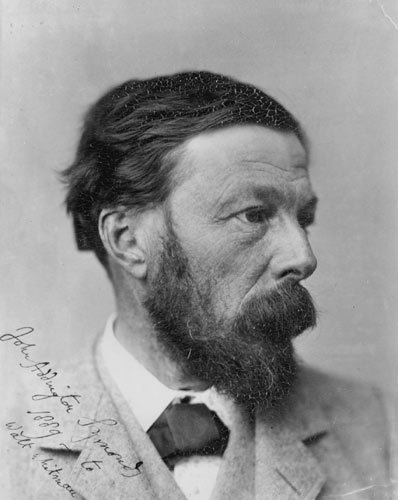
John Addington Symonds
John Addington Symonds Jr. (/ˈsɪməndz/; 5 October 1840 – 19 April 1893) was an English poet and literary critic. A cultural historian, he was known for his work on the Renaissance, as well as numerous biographies of writers and artists. Although married with children, Symonds supported male love (homosexuality), which he believed could include pederastic as well as egalitarian relationships, referring to it as l'amour de l'impossible (love of the impossible).[1] He also wrote much poetry inspired by his same-sex affairs.
For his father, see John Addington Symonds (physician).Early life and education[edit]
Symonds was born in Bristol, England, in 1840. His father, the physician John Addington Symonds (1807–1871), was the author of Criminal Responsibility (1869), The Principles of Beauty (1857) and Sleep and Dreams. The younger Symonds, considered delicate, did not take part in games at Harrow School after the age of 14, and he showed no particular promise as a scholar.[2]
Symonds moved to Clifton Hill House at the age of ten, an event which he believed had a large and beneficial impact towards his health and spiritual development. Symonds's delicate condition continued, and as a child he suffered from nightmares in which corpses in and under his bed prompted sleepwalking; on one such occasion he was almost drowned when, sleepwalking in the attic of Clifton Hill House, he reached a cistern of rainwater. According to Symonds, an angel with "blue eyes and wavy, blonde hair" woke him and brought him to safety; this figure frequented Symonds's dreams and was potentially his first homosexual awakening.
In January 1858, Symonds received a letter from his friend Alfred Pretor (1840–1908), telling of Pretor's affair with their headmaster, Charles John Vaughan. Symonds was shocked and disgusted, feelings complicated by his growing awareness of his own homosexuality. He did not mention the incident for more than a year until in 1859, when a student at Oxford University, he told the story to John Conington, the Latin professor. Conington approved of romantic relationships between men and boys. Earlier, he had given Symonds a copy of Ionica, a collection of homoerotic verse by William Johnson Cory, the influential Eton College master and advocate of pederastic pedagogy. Conington encouraged Symonds to tell his father about his friend's affair, and the senior Symonds forced Vaughan to resign from Harrow. Pretor was angered by the younger man's part, and never spoke to Symonds again.[3]
In the autumn of 1858, Symonds went to Balliol College, Oxford, as a commoner but was elected to an exhibition in the following year. In spring of that same year, he fell in love with William Fear Dyer (1843–1905), a Bristol choirboy three years younger. They engaged in a chaste love affair that lasted a year, until broken up by Symonds. The friendship continued for several years afterwards, until at least 1864. Dyer became organist and choirmaster of St Nicholas' Church, Bristol.
At Oxford University, Symonds became engaged in his studies and began to demonstrate his academic ability. In 1860, he took a first in Mods and won the Newdigate prize with a poem on "The Escorial"; in 1862 he obtained a first in Literae Humaniores, and in 1863 won the Chancellor's English Essay.[2]
In 1862, Symonds was elected to an open fellowship at the conservative Magdalen. He made friends with a C. G. H. Shorting, whom he took as a private pupil. When Symonds refused to help Shorting gain admission to Magdalen, the younger man wrote to school officials alleging "that I [Symonds] had supported him in his pursuit of the chorister Walter Thomas Goolden (1848–1901), that I shared his habits and was bent on the same path."[4] Although Symonds was officially cleared of any wrongdoing, he suffered a breakdown from the stress and shortly thereafter left the university for Switzerland.[2]